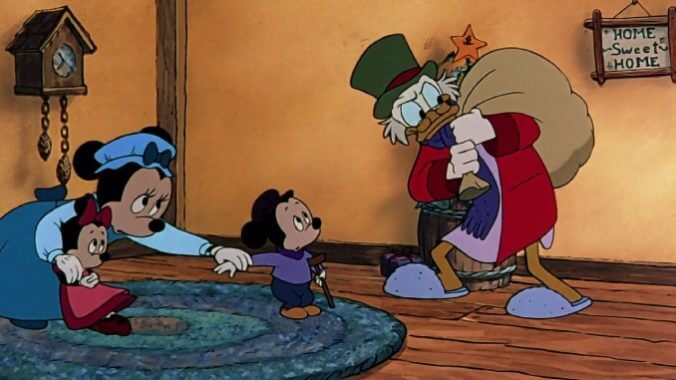Walt Disney’s Century: Mickey’s Christmas Carol
In an adaptation of the quintessential holiday story, Disney brought back Mickey for a script he barely appears in.

This year, The Walt Disney Company turns 100 years old. For good or ill, no other company has been more influential in the history of film. Walt Disney’s Century is a monthly feature in which Ken Lowe revisits the landmark entries in Disney’s filmography to reflect on what they meant for the Mouse House—and how they changed cinema. You can read all the entries here.
The Walt Disney Company is a house built on adaptations of well-known works. Even its very first cartoon, Steamboat Willie, is pretty transparently a play off of another film, Buster Keaton’s 1928 Steamboat Bill, Jr. That’s not to diminish anything that the Mouse House has done in its hundred years of movie magic: Animation, the company’s (nearly former) stock-in-trade, is a difficult and labor-intensive process, and one figures that going with a script you already know will captivate audiences frees you up to focus on bringing imagery and characters to life. Besides, most stories are just older stories dressed differently, anyway. The magic is always in the telling.
By 1983, Mickey Mouse had long ceased to be a star in Disney features. The late ’70s and early ’80s were, in fact, a nadir for Disney’s animation studio, a time that saw talent strike out for new horizons. The Sword in the Stone and The Black Cauldron both reviewed pretty terribly. Disney animated movies, once the world standard, were in decline. It wasn’t really until the late ’80s, with Who Framed Roger Rabbit? and The Little Mermaid, that cartoons ruled the roost again at the company, and at the box office. So in that regard, a little less-than-30-minute short animated film dropping in 1983, starring Mickey Mouse, feels like something of a small miracle.
-

-

-

-

-

-

-

-

-

-

-

-

-

-

-

-

-

-

-

-

-

-

-

-

-

-

-

-

-

-

-

-

-

-

-

-

-

-

-

-








































